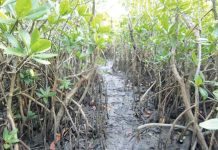
ABACA – a fiber from the Philippines used in teabags and banknotes – could replace plastic in millions of face masks and hospital gowns the world is making to combat COVID-19.
Philippine fiber agency head Kennedy Costales said abaca is as durable as polyester but will decompose within two months.
“With this pandemic, if we all buy masks made of synthetic fiber, they will pile up in dumpsites because they take so long to decompose,” Costales said.
A preliminary study by the Department of Science and Technology (DOST) in the Philippines showed abaca paper to be more water resistant than a commercial N-95 mask, and to have pore sizes within the United States Centres for Disease Control and Prevention’s recommended range to filter hazardous particles.
Costales said abaca demand could grow exponentially this year, with 10 percent of production going to medical uses, compared with less than one percent last year.
Philippines as the world’s largest producer has been supplying 85 percent of the fiber in 2017, according to the latest data from the United Nations Food and Agriculture Organisation. Global production is projected to be worth US$100 million this year, Mr Gurnani said.
The fiber, stripped from the trunks of the abaca tree, was used for saltwater-resistant ship ropes and Manila envelopes in the 19th century. Up to 30 per cent of Japan’s banknotes are made of it and abaca yarn has been used in Mercedes-Benz cars.
Even though the plant fiber is more expensive to produce than plastic alternatives, manufacturers of protective health gear from China, India and Vietnam have placed new orders for the fiber over the past months, prompting Philippine fiber factories to double their output, said abaca exporter Firat Kabasakalli.
“People see this pandemic lasting for some time, so even small companies are trying to make protective equipment, which require our fiber,” said Kabasakalli. “We are getting a lot of inquiries from new clients abroad.”
One company in southern Philippines which makes greeting cards and paper from the fiber for export to the United States and Europe has shifted to making masks.
“The awareness of consumers now is higher when it comes to taking care of the environment,” said businessman Neil Francis Rafisura. “There are people who will pay a premium for environmentally friendly products.”
Abaca production, however, cannot keep up with demand, according to Costales.
While he estimates that growers will increase output to 74,000 metric tons this year, that is not enough to meet even last year’s supply deficit of about 125,000 tons, he said. Part of the reason is that farmers in the Philippines lack government subsidies to raise output.
“Abaca is like precious gold for the Philippines, but it’s been often overlooked because the government prioritizes crops that feed people,” Costales said. “This is a missed opportunity for us.”(with reports from Bloomberg/PN)



